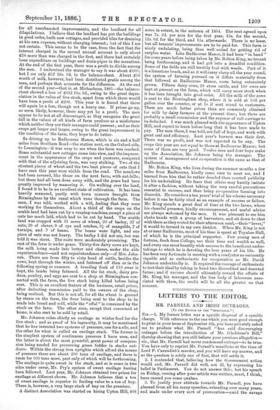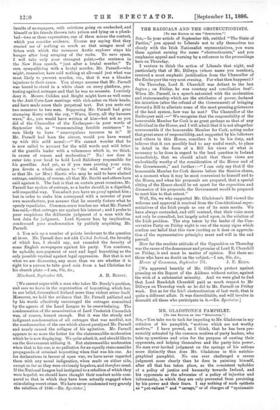LETTERS TO THE EDITOR.
MEL PARNELL AND IRISH OUTRAGES.
TO THE EDITOR OP THE " SPECTATOR."]
Sut.-1. My former letter was a specific disproof of a specific charge. With reference to the one which you were good enough to print in your issue of September 4th, you have privately asked me to produce what Mr. Parnell " has said discouraging outrages before the introduction of Mr. Gladstone's Bill," thereby showing that you still believe your previous allegation— viz., that Mr. Parnell had never condemned outrage—to be true. You have only to reprint Mr. Parnell's manifesto at the time of Lord F. Cavendish's murder, and you will have my answer, and as the question is solely one of fact, that will settle it.
2. I contended that, believing how the Government action would end, Mr. Parnell did well, not ill, by expressing his belief in Parliament. You do not answer this ; but his speech on Friday, coming after your article was written, mast, I think, have caused you some qualms.
3. To justify your attitude towards Mr. Parnell, you have gleaned from all his many speeches, extending over many years, and made under every sort of provocation—amid the savage insults of newspapers, with evictions going on unchecked, and himself or his friends thrown into prison and lying on a plank- bed—two or three expressions, one of them minus the context, which you consider evidence. Excuse my saying that they remind me of nothing so much as that meagre meal of lichen with which the ravenous Arctic explorer stays his hunger after long scraping of the rocks. To save space, I will take only your strongest point,—the sentence in the New Ross speech, "just after a brutal murder." To men sympathising with a brutal murder, Mr. Parnell—who might, remember, have said nothing at all—said just what was most likely to prevent murder, viz., that it was a blunder injurious to their cause. You always assume that Mr. Parnell was bound to stand in a white sheet on every platform, pro- testing against outrages and that he was no assassin. I entirely deny it. Messrs. Cobden and Bright might have as well come to the Anti-Corn•Law meetings with rick-ashes on their heads, and have made arson their perpetual text. But you mete out two measures to two men. Supposing Mr. Parnell had gone stumping Kerry with the cry, " Wave, Kerry, all thy banners wave," &c., you would have written of him—but not as you did of the Chancellor of the Exchequer—in your words of September 4th, as "recommending forcible resistance" to men likely to have " unscrupulous recourse to it." If Mr. Parnell had been the sinner, would you have wound up with this mild moral :—" We cannot wonder that he is now called to account for the wild words and wild letter of the guerilla leader with a vehemence which is, we think, in excess of reason and moderation !" No ! nor does it enter into your head to hold Lord Salisbury responsible for Isis guerillas. And yet, as if you were proving your case, you devote a whole column to " the wild words " of this or that Mr. (or Mrs.) Harris who may be said to have abetted outrage, omitting, of course, all that Mr. Davitt and others have said against it. The fact is that on certain great occasions, Mr. Parnell has spoken of outrage, as a leader should, in a dignified, self-respectful way. You admit you have no proof against him ; but in order to make him correspond with a monster of your own manufacture, you assume that he secretly fosters what he openly repudiates. Common-sense teaches me what Mr. Parnell has said,—that outrages are against his interest ; and I prefer to your suspicions the deliberate judgment of a man with the best data for judgment. Lord Spencer has, by implication, condemned your condemnation by publicly acquitting Mr. Parnell.
4. You mix up a number of points irrelevant to the question at issue. Mr. Parnell does not edit United Ireland, the ferocity of which has, I should say, not exceeded the ferocity of some English newspapers against his party. You condemn, he upholds, non-payment of rent and legal boycotting as the only possible reprisal against legal oppression. But that is not what we are discussing, any more than we are whether it is right for a parson to take good coin from a bad Christian for his church plate.—I am, Sir, &es Minehead, September 6th. A. H. BEESLY.
[We cannot argue with a man who takes Mr. Beesly's position, and sees no harm in the organisation of boycotting, which has, in our belief, demoralised. Ireland more than violent crime itself, Moreover, we hold the evidence that Mr. Parnell palliated and by his words effectively encouraged the outrages committed by the agents of the Land League to be overwhelming. The condemnation of the assassination of Lord Frederick Cavendish was, of course, honest enough. But it was the steady and indignant condemnation of all outrages that was needful, not the condemnation of the one which almost paralysed Mr. Parnell and nearly caused the collapse of his agitation. Mr. Parnell appears to us none the better for the statesmanlike moderation which he is now displaying. We quite admit it, and should like to see the Government utilising it. But statesmanlike moderation when that is his cue, is no palliation for an equally statesmanlike propaganda of criminal boycotting when that was his cue. As for declarations in favour of open war, we have never regarded them with any moral indignation, when made on either side, except so far as they were obviously hopeless, and therefore creel. If the National League had instigated to a rebellion of which they were hopeful, we should have thought their conduct noble com- pared to that in which they have been actually engaged when stimulating secret crime. We have never condemned very gravely the rebellion of 1848.—En. Spectator.]•



































 Previous page
Previous page